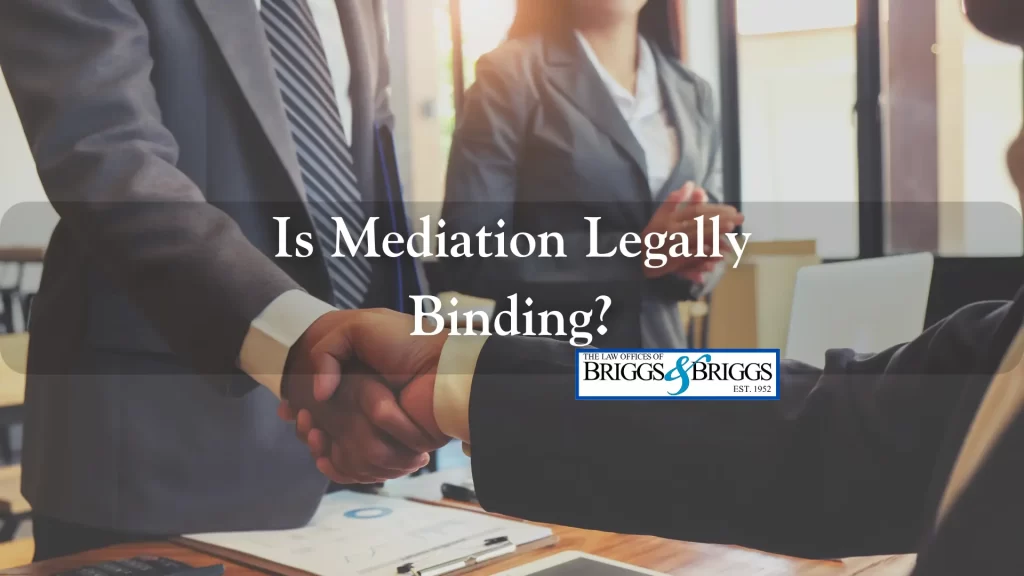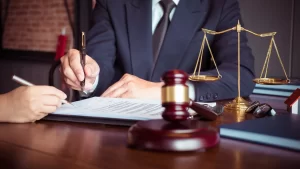Posted on Friday, September 15th, 2023 at 9:00 am

People have many questions about mediation, one of the most common being whether mediation is legally binding in Washington. The answer is yes, it can be. Although mediation is an alternative form of dispute resolution overseen by a mediator instead of a judge, a signed mediation agreement is legally binding in personal injury cases and can be enforced by the courts.
At The Law Offices of Briggs & Briggs, we want to help you prepare for the mediation process. When you understand what to expect from the process and know the outcome will be legally enforceable, you can navigate mediation from a position of strength.
Understanding the Mediation Process
Mediation allows people to resolve disputes quickly and without going through the formal, costly, and emotionally taxing process of participating in a trial. In mediation, a neutral third party works with both sides to facilitate meaningful communication and work toward a settlement agreement that is mutually beneficial to both sides. Often, mediators are retired judges or private attorneys, individuals with extensive knowledge of the legal and mediation process.
There are significant differences between mediation and a trial, although both outcomes are legally binding. Mediation is less formal than a trial, which helps to make people more comfortable with the process and less anxious. There is also confidentiality in mediation. Before engaging in the mediation process, both parties sign a confidentiality agreement. Court cases are different and are a matter of public record.
Another advantage of the mediation process is that the parties have some control over the outcome. If your case goes to court, the only people with a voice in how the final decision is made are the judge and jury, if there is one. With mediation, you can determine which issues are more important to you and compromise on those that aren’t as critical.
During mediation, discussions between parties are confidential and non-binding. It gives both sides the freedom and flexibility to communicate their expectations and concerns moving forward. However, a signed mediation agreement becomes legally enforceable when both sides reach a mutual settlement arrangement.
Does Mediation Mean Settlement?
The process of mediation can ultimately lead to a settlement agreement. However, mediation doesn’t always end in a settlement both parties can agree to. There is a distinct difference between mediation discussions and a mediation agreement. A mediation discussion is the vehicle that leads to a mutual mediation resolution and legally binding agreement. A mediator facilitates communications between two parties, helping each side to understand the other’s perspective and bringing them closer to agreeing on a fair settlement offer. A mediation agreement occurs when both parties agree to resolve their dispute, ending discussions and further negotiations.
A mediation agreement only becomes binding when both parties sign a written contract or agreement. This step in the process occurs when both sides complete negotiations and agree to the terms of a dispute resolution. The document gets sent to a judge for approval. If a judge approves of the terms, the agreement is legally binding.
When both parties sign a mediation agreement contract, the terms of that contract become legally enforceable by the court, meaning that if one or both parties do not fulfill the terms of the arrangement, the other party can turn to the court system for help enforcing it.
What If Mediation Doesn’t Lead to a Settlement?
 Unfortunately, not all mediation sessions end in an agreeable settlement arrangement. Even in mediation, negotiations can break down between parties; sometimes, there is no possible amicable agreement or settlement. There are always three possible outcomes of mediation. First, you and the other party resolve your differences and agree to a fair settlement amount.
Unfortunately, not all mediation sessions end in an agreeable settlement arrangement. Even in mediation, negotiations can break down between parties; sometimes, there is no possible amicable agreement or settlement. There are always three possible outcomes of mediation. First, you and the other party resolve your differences and agree to a fair settlement amount.
Second, you haven’t reached an appropriate settlement, but you believe you’re close. The parties can schedule another session to finish the negotiations.
The third potential outcome is that you and the other party cannot reach a mutual settlement agreement, and negotiations stall. When this occurs, taking your case to court and letting a judge or jury decide the situation’s outcome becomes necessary. Transitioning from mediation to a formal court trial can be challenging. An experienced personal injury attorney can help you navigate this change and prepare you for what to expect next. The trial process can be much more intense and time-consuming.
Instead of both parties communicating with one another to work out their differences, each side gets the opportunity to present their case and support evidence to a judge or jury in a trial. After each side concludes their case, it is up to the judge or jury to determine the outcome of the situation by examining the evidence presented and the strengths of each case. The decision of the court is legally binding. If you disagree with the decision reached by the judge or jury, you may appeal the verdict to a higher court if there is reason to believe the lower court made procedural errors.
The Value of Mediation in Personal Injury Cases
Mediation offers you a faster path toward an amicable settlement. Unfortunately, court cases can be lengthy, complicated, and expensive. Mediation is one option that gives you the power to present your case and negotiate with the other party for the compensation you deserve. Working with an experienced personal injury attorney during mediation can also increase your chances of obtaining a favorable outcome.
However, mediation is not a process you should enter lightly. Mediation may not occur before a judge or jury, but it is still a serious legal process. Entering the mediation process and agreeing to the terms of a settlement offer without understanding the legal implications of your actions can be disastrous. An attorney can help you understand your legal rights to get the most out of mediation.
Is mediation right for you? Discuss your case with a knowledgeable personal injury attorney from The Law Offices of Briggs & Briggs. We can review your situation and outline the legal options that offer you the best chance of recovering the money you deserve. Call our Washington office at (253) 588-6696 and talk to our legal team about setting up a legal consultation.
Related Posts
How to File an Insurance Claim After a Car Accident
What You Need to Know About Your Car Accident Claim
Why Would an Insurance Claim Be Denied After a Car Accident?
